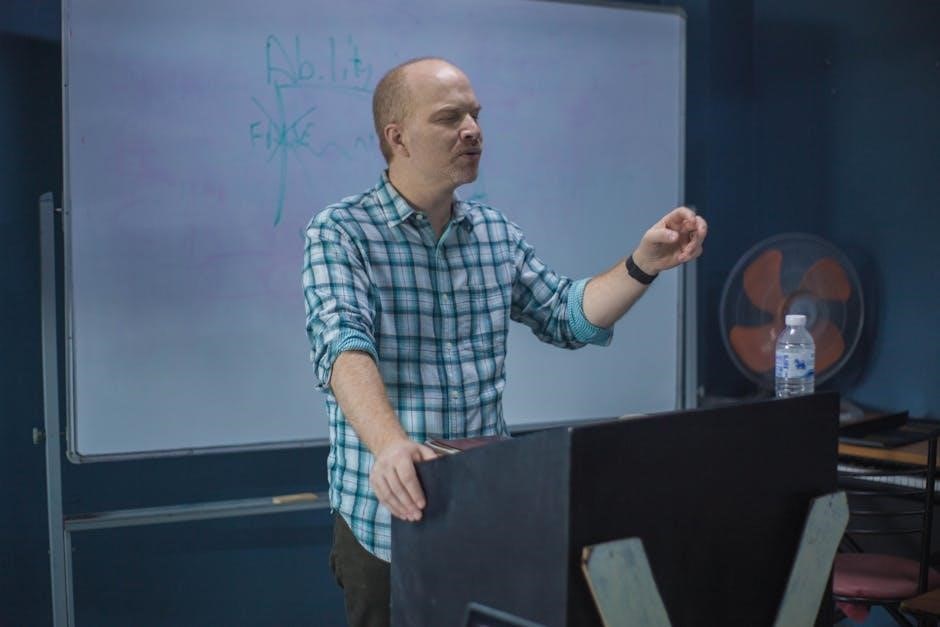christian higher education an empirical guide
Christian higher education offers a unique blend of faith and academia, shaping minds through a biblical lens․ Christian Higher Education: An Empirical Guide provides a comprehensive analysis, exploring the landscape, challenges, and opportunities within this sector, equipping stakeholders with data-driven insights to navigate its complexities effectively․
The Importance of Understanding the Christian Higher Education Landscape
Understanding the Christian higher education landscape is crucial for navigating its complexities and diversity․ With over 500 institutions varying in size, theology, and academic focus, stakeholders need clarity to make informed decisions․ This landscape influences not only students’ academic and spiritual growth but also the broader societal impact of these institutions․ Empirical research, such as the 27-point Christian Identity Guide, provides tools to assess and compare institutions, ensuring alignment with their mission and values in an evolving world․
The Role of Empirical Research in Shaping Christian Higher Education
Empirical research plays a pivotal role in shaping Christian higher education by providing data-driven insights into institutional identity, practices, and outcomes․ Tools like the 27-point Christian Identity Guide offer measurable criteria to assess how effectively institutions align with their religious missions․ This approach ensures decisions are grounded in evidence, enabling Christian colleges and universities to navigate challenges while maintaining academic rigor and faithfulness to their core values․

The Christian Identity Guide (OCIG): A Framework for Assessment
The OCIG is a 27-point framework designed to evaluate Christian identity in higher education․ It provides empirical metrics to assess alignment with religious missions, ensuring institutions maintain their faith-driven purpose while fostering academic excellence and integrity․
Understanding the 27-Point Tool for Evaluating Christian Identity
The 27-point tool within the OCIG framework systematically evaluates institutional commitment to Christian identity․ It assesses alignment with religious missions across academics, community life, and policies․ By providing empirical metrics, the tool ensures transparency and accountability, helping institutions maintain their faith-driven purpose․ This comprehensive approach fosters a deeper understanding of how Christian identity is operationalized, enabling informed decision-making and strategic improvements aligned with religious and academic goals․
How the OCIG Addresses Gaps in Higher Education Research
The OCIG fills a critical gap in higher education research by providing empirical metrics to evaluate Christian identity․ Previously, assessments lacked standardized tools, making comparisons challenging․ The 27-point tool offers a data-driven approach, enabling institutions to measure alignment with Christian values․ This framework enhances transparency, accountability, and scholarly understanding, ensuring that Christian colleges and universities can articulate and maintain their religious identity effectively in an evolving academic landscape․

Christian Higher Education: An Empirical Guide (Book Review)
Christian Higher Education: An Empirical Guide by Perry L․ Glanzer, Theodore F․ Cockle, and Jessica Martin offers a comprehensive, objective analysis of Christian colleges, providing credible, data-driven insights into the sector’s complexities and opportunities;
Overview of the Book by Perry L․ Glanzer, Theodore F․ Cockle, and Jessica Martin
Christian Higher Education: An Empirical Guide by Perry L․ Glanzer, Theodore F․ Cockle, and Jessica Martin is a groundbreaking work published by Abilene Christian University Press in 2023․ This 176-page book provides an objective, comprehensive assessment of over 500 Christian colleges and universities, introducing the innovative Christian Identity Guide (OCIG), a 27-point tool for evaluating institutional Christian identity․ It offers a data-driven exploration of the sector, moving beyond anecdotes to reveal the complexities of integrating faith and academia․
Key Insights and Contributions to the Field
Christian Higher Education: An Empirical Guide fills a critical gap by providing empirical metrics for assessing Christian identity in higher education․ The book introduces the Christian Identity Guide (OCIG), a 27-point tool that evaluates institutional faith expression․ It offers actionable insights for stakeholders, fostering data-driven discussions on integrating faith and academia․ By moving beyond anecdotal evidence, the guide empowers Christian colleges to navigate identity-related challenges effectively, ensuring their mission remains central to their academic and religious pursuits․

The Economic Impact of Christian Higher Education
Christian higher education institutions contribute significantly to local economies, creating jobs and fostering community development․ Baylor University and Abilene Christian University exemplify such economic and societal impact․
Studies on the Economic Contributions of Christian Institutions
A groundbreaking study by Econsult Solutions highlights the significant economic contributions of Christian higher education institutions․ These institutions generate substantial revenue, create jobs, and foster local economic growth․ For instance, Baylor University and Abilene Christian University contribute millions annually through operations, faculty and staff spending, and capital projects․ This economic impact underscores the vital role these institutions play in their communities, beyond their academic and spiritual missions․
Case Studies: Baylor University and Abilene Christian University
Baylor University, a leading Christian institution, exemplifies the integration of faith and academic excellence․ Its research initiatives and economic contributions, including job creation and community engagement, highlight its societal impact․ Similarly, Abilene Christian University stands out for its innovative facilities, such as the state-of-the-art Engineering and Physics building, fostering interdisciplinary research and student development․ Both universities demonstrate how Christian higher education combines spiritual mission with tangible economic and academic benefits, enriching their communities and beyond․

Empirical Research Methods in Christian Higher Education
Empirical research methods in Christian higher education involve systematic data collection and analysis to study institutional practices, student outcomes, and faith-integration strategies․ These approaches bridge faith and learning, providing actionable insights for improving academic and spiritual programs while maintaining institutional identity․
Approaches to Studying Phenomena in Christian Higher Education
Empirical research in Christian higher education employs diverse methodologies, including qualitative, quantitative, and mixed-methods approaches․ These methods enable scholars to systematically investigate institutional practices, student experiences, and faith integration․ Surveys, interviews, and case studies are commonly used to gather data, while statistical analysis and thematic interpretation provide deeper insights․ Such approaches help bridge the gap between theory and practice, offering actionable recommendations for enhancing academic and spiritual outcomes within Christian institutions․
Original Research and Its Role in Academic Literature
Original research plays a pivotal role in advancing academic literature within Christian higher education․ By presenting empirical studies, it extends theoretical understanding and offers practical recommendations․ The book Christian Higher Education: An Empirical Guide exemplifies this by providing a comprehensive analysis of over 500 institutions, offering credible insights into faith integration and institutional practices․ Such research not only fills gaps in existing literature but also serves as a foundation for future inquiries, enriching the field with data-driven perspectives․

Faculty and Leadership in Christian Higher Education
Faculty and leadership are integral to shaping Christian identity in higher education․ Senior leaders influence institutional mission, while faculty contribute through teaching, research, and mentorship, fostering faith integration․
The Influence of Senior Leaders on Institutional Identity
Senior leaders play a vital role in shaping the Christian identity of higher education institutions․ Their decisions and vision directly impact the mission, culture, and academic programs․ Research indicates that over half of senior leaders emphasize maintaining a strong Christian identity, influencing faculty hiring, curriculum design, and campus initiatives․ Their leadership sets the tone for integrating faith into academia, ensuring alignment with institutional values and fostering a cohesive community committed to spiritual and intellectual growth․
Research on Faculty Perspectives and Contributions
Faculty members are integral to the Christian identity and academic excellence of higher education institutions․ Research reveals their perspectives on integrating faith into teaching and scholarship, shaping the spiritual and intellectual environment․ Faculty contributions extend beyond academia, influencing institutional mission alignment and student development․ Studies highlight their role in fostering a cohesive community and upholding Christian values, ensuring that education remains deeply rooted in faith while maintaining academic rigor and relevance․

Challenges and Opportunities in Christian Higher Education
Christian higher education navigates theological and academic challenges while embracing opportunities for innovation and growth, ensuring faith-integrated education remains relevant in a rapidly changing cultural landscape․
Navigating Theological and Academic Challenges
Christian higher education faces challenges in integrating faith with academic rigor, ensuring theological integrity while maintaining intellectual freedom․ Institutions must balance doctrinal commitments with diverse student perspectives․ Faculty play a crucial role in modeling faith-informed scholarship, while administrators navigate cultural shifts and accreditation standards․ Empirical research highlights strategies for fostering environments where faith and learning thrive, addressing tensions between tradition and innovation․ These challenges require intentional leadership and a commitment to institutional identity rooted in Christian values․
Strategies for Maintaining Christian Identity in a Changing World
Institutions of Christian higher education must employ intentional strategies to maintain their faith-driven mission amid societal shifts․ The Christian Identity Guide offers a 27-point tool to assess and strengthen religious identity․ By integrating faith into curriculum, fostering spiritual growth, and promoting campus culture aligned with Christian values, colleges can remain steadfast․ Empirical research underscores the importance of leadership and clear institutional policies in navigating modern challenges while preserving theological integrity and academic excellence․
The future of Christian higher education relies on embracing emerging trends, empirical research, and the OCIG framework to guide institutions in maintaining their faith-driven identity and academic excellence․
Emerging Trends and Their Implications
Emerging trends in Christian higher education emphasize the integration of faith and learning, with institutions leveraging empirical tools like the OCIG to assess and strengthen their Christian identity․ The rise of data-driven decision-making and interdisciplinary research highlights the sector’s adaptability․ Additionally, the growing focus on faculty and leadership development underscores the importance of aligning institutional mission with academic excellence․ These trends position Christian higher education to thrive in a rapidly changing global landscape while staying true to its foundational values․
The Role of Empirical Guides in Shaping the Future
Empirical guides like Christian Higher Education: An Empirical Guide are pivotal in shaping the future of the sector․ By providing data-driven frameworks, such as the OCIG, these resources enable institutions to assess and strengthen their Christian identity strategically․ They also facilitate informed decision-making and innovation, ensuring alignment with biblical values while addressing modern challenges․ These guides empower leaders to navigate complexities effectively, fostering a vibrant and mission-driven future for Christian higher education․


